Beaches, public baths, swimming pools are all places where it is easy to be infected with onychomycosis. In addition, nail fungus may develop if you do not follow
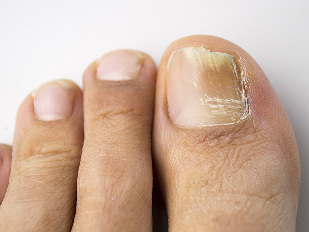 hygiene, to wear uncomfortable or dirty shoes. At the present stage of development of medicine there are tools to effectively fight the disease, but the treatment process is long and complex.
hygiene, to wear uncomfortable or dirty shoes. At the present stage of development of medicine there are tools to effectively fight the disease, but the treatment process is long and complex.
The classification of onychomycosis
The type of nail fungus can depend on tactics, duration, and complexity of future treatment. It is therefore important to determine which scenario is observed in this case. There are several classifications of onychomycosis. The most popular are two of them that best reflect all the details of the destruction of nail fungus.
Classification of Russian scientists:
- Normotroficheskaya form of onychomycosis. Changes the color of the nail plate, there are longitudinal stripes and spots, located mainly in the lateral (closer to the cuticle) parts of the nail. The thickness and density of the nail in this form does not change.
- The hypertrophic form. The nail plate is thickened due to hyperkeratosis. Disappears healthy Shine of the nail, it becomes rough, thick, there may be flaking or crumbling on the sides.
- Animalisticheskaya form. Observed atrophic changes in the nail, starting from the distal edge, there are areas of delamination, which first appear as white areas. The color of the nail plate becomes pale, greyish.
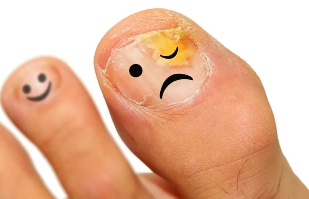
The classification proposed by N. Zaias in 1972:
- Distal subungual form. The changes affect the nail tip, it becomes thinner, flaking, crumbling, you may experience abnormal growth and thickening (growing wave). The color of the whole nail becomes yellow, white or gray.
- Surface form. Pronounced changes in the appearance of white spots and stripes, which gradually increases, changing the structure and become darker.
- The proximal subungual form. Originates at the back of the nail shaft and extends in the proximal direction of the cuticle.
- Total dystrophic form. The entire nail becomes irregular in structure, thickened, changed its color, it is destroyed.
Externally onychomycosis in the early stages it is easy to take for regular nail injury or the manifestation of beriberi.
Treatment of nail fungus
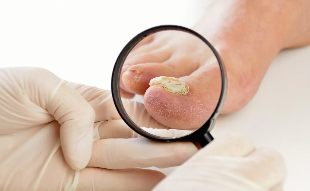
To begin with you should understand that nail fungus is a disease that will not heal itself, even if to eliminate damaging factors. For the treatment of nail fungus often resort to combination therapy. The therapeutic actions are antimycotic funds. Depending on the extent of damage to the nail plate and form of the disease, can be chosen different tactics of treatment:
- Local treatment. Acceptable only in the early stages of the disease. The drugs are used superficially in the form of ointments, creams, nail Polish.
- The systemic therapy. Necessary for more serious damage when the onychomycosis affected more than half of the nail. In this case, in the course are, in addition to local funds, and even medications that are taken inside.
It's hard to choose one best remedy for nail fungus, so a common approach is needed. Note that the complexity of therapy takes into account some sanitary measures. In particular, when the diagnosis of onychomycosis treatment required disinfection of shoes, socks, gloves, clothing in contact with affected area, a thorough treatment of towels, personal hygiene. These actions are carried out in special disinfectants.
Systemic treatment: pills

Treatment is preformed by means of a system call, since the substance enters the body, absorbed into the bloodstream and current is supplied to accumulate in high active concentrations. The system approach is particularly justified because it allows to prevent complications of the disease and extend full assistance "from all sides". Have system tools there are a number of contraindications and restrictions for use. For example, they should not be taken during pregnancy and breastfeeding. Therefore, before their use is required specialist advice.
Local therapy: ointment
Topical treatment of onychomycosis is extremely effective because the fungus prefers a long time to remain on the surface. But only in the initial stages of the disease. An invaluable advantage of local drugs is that they immediately act directly on the lesion without circulation throughout the body. That is, the potential adverse effects of such funds are minimized. In addition to the antimycotic component to the ointment includes an antibiotic corticosteroid and anti-inflammatory element. It relieves local itching and irritation. All ointments should be applied to clean, dry skin not only at the site of injury, but and around, capturing the healthy areas. Treatment ointments is carried out for 2-8 weeks depending on the activity of the drug, the lesion and medical advice. Structure of the cream is not able to penetrate into the deeper layers of the nail and skin, so for effective application need to prepare the damaged area. The nail plate should be as cut (so that the nail peels off and crumbles, it is easy to do and doesn't hurt). The cream is applied directly on the skin the pad under the nail and around the damaged tissue.
Local therapy: antimycotic nail varnish
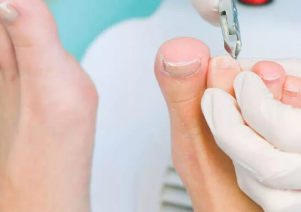
Therapeutic anti-fungal nail polishes are another indispensable tool for local use. Of course, the varnish should be used in conjunction with creams or ointments. First and foremost, you should know the opinion of your doctor. Different funds may have different methods of application, which should inquire of the physician or the instructions for use. Most often, the lacquer is applied 1-2 times daily on cleansed nail. Treatment continued for at least 2 weeks.
The treatment of severe onychomycosis
In severe advanced cases of onychomycosis require an integrated approach to therapy. In this case, the doctor selects the optimal combination of drugs local action and system tools. This approach has many positive aspects:
- It reduces the time of treatment (for example, instead of 18 months in the treatment of onychomycosis with griseofulvin stop – only until year of complex therapy).
- Reduces the risk of adverse reactions from the body (through the use of lower drug doses and redistribution of local and systemic tools that you need to drink inside).
- Greatly reduces the possibility of recurrence of the disease.
- The opportunity to affect not only the fungus that "on the surface", but may spread the infection to other tissues of the body.
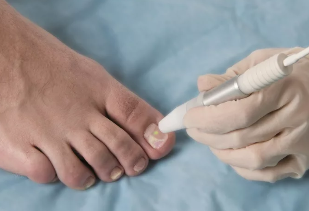
For the selection of complex therapy is required to carefully examine the medical history of the disease and to collect all data on the pathogen. Then the doctor will be able to choose the most effective in this case, the drugs would have an immediate positive effect.
Means for painless removal of the affected nail
In today's world, when it is difficult to find the time to get to the doctor's office, people used to use the methods for self-treatment. One of them is a painless way of removing the affected nail fungus. It is understood that this does not equate exactly to the treatment of nail fungus. Rather, it is a temporary postponement of treatment and an alternative to surgical intervention. The basis of the compositions of such preparations include propylene glycol, urea and various acids and oil. This complex of substances has a few steps:
- anti-inflammatory, analgesic and reduces swelling;
- softening effect on the nail that contribute to its detachment;
- protivotoksicheskoe action;
- an antiseptic effect.
After the diseased nail is removed, you should use a cream to accelerate the growth of a new nail plate. It disinfects open the fabric and creates favorable conditions for the growth of the new nail. Mind you, if you feel discomfort at the site of application of the cream, burning, pain or itching, you should immediately remove the poultice, rinse the site of application. If you experience discomfort, burning or itching in the treatment area to immediately remove the patch, wash with soap and water and consult a specialist.
The treatment of onychomycosis in children
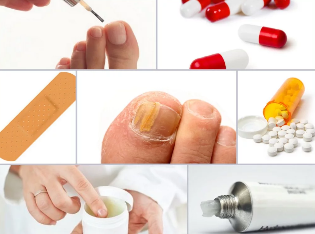
Treatment of any disease, including onychomycosis in children should be under the strict supervision of a physician. The child's body has its own characteristics, which limit the application by some means. For example, the kid's body still formed a strong immunity system. The child of a certain age continued growth and development of almost all organs and systems. Given the high toxicity of many antifungal substances, their use in children is strictly limited. For the treatment of onychomycosis in children sometimes prescribe creams for local application. On the one hand, they are more safe because it does not have systemic effects, but can cause allergic reactions that many children tend. Therefore, the appointment of antifungal drugs should be a doctor who is familiar with the anamnesis of the child.
Effective methods for the treatment of onychomycosis of traditional medicine
Folk remedies for home self-treatment is unlikely to help to cure the disease completely. However, they can remove the unpleasant symptoms – itching, burning, pain, swelling, redness. In addition, they can become another link in the complex treatment of nail fungus. Folk remedies is the most cost effective method of treatment and recovery during and after illness. In the ranking of the most proven effective methods of treatment of onychomycosis includes the following methods:
- hydrogen peroxide;
- vinegar;
- iodine;
- tea tree oil;
- various essential oils.
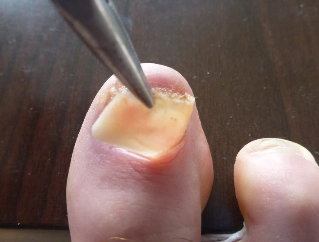
All these methods are time-tested and a large number of people. Moreover, their effectiveness can be easily explained from the medical point of view. Most of the drugs of modern medicine contain in their composition of these components. So, of course, folk remedies have the right to exist.
Hydrogen peroxide
Hydrogen peroxide has a strong antibacterial action. It can be found in the home medicine Cabinet of almost any family. And buy in the pharmacy, it easier simple, because it is sold without a prescription. For the treatment of onychomycosis hydrogen peroxide is used as a compress on the affected area feet or hands. First you need to thoroughly wash the area with soap under warm water, steam the nails with the addition of soap or soda. Thoroughly dry the area so it remained liquid. Next is the hygienic care of the nails – cut them as short as possible and file the nail file. Of cotton wool and bandages, preparing cotton-gauze pads which need to be impregnated with hydrogen peroxide. Based compress applied to the affected area, and fix several layers of bandage, knotted (not to pinch the blood flow). The top is wrapped in plastic wrap. This compress is held 30 minutes, after which it must be removed and washed with warm water affected area. This procedure is performed every day until appearance of effect.
Iodine application
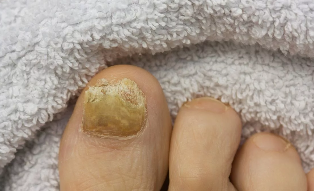
The situation with iodine is about the same as with hydrogen peroxide. He is in almost every house, and in which case it can be expensive to buy at the pharmacy. Iodine has fungicidal properties, while inhibited the growth and reproduction of the fungus, die off the cells. Skin and nails it works, relieving inflammation and itching. Before the procedure, thoroughly rinse the site of injury with soap and water, to treat a cosmetic way, and wipe dry. You also need to prepare a container of soda solution. Then you can apply iodine to the nails, cuticles and the skin between the toes. Then dip your feet in a soda solution for 30 minutes.
This method has several contraindications and side effects:
- Can occur individual intolerance of iodine.
- The presence of thyroid disease requires consultation with a specialist before the procedure.
- Possible local irritation, pain.
Essential oils
There is some scientific evidence that essential oils effectively fight fungal infections. In particular, the essential oil of cinnamon can be used against onychomycosis. Cinnamon is able to regulate the content of sugar in the blood – the main "food" mushrooms. Preparation before use of essential oil of cinnamon similarly to steam leg, using the nail scissors and nail file, wipe dry. Cinnamon oil should be spread on the nail and RUB into the cuticle area immediately after that. In order to make it work, nails should be steamed.
Foundation for the prevention of onychomycosis
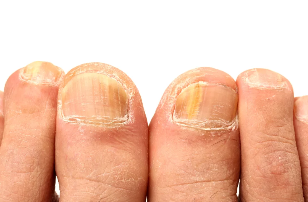
To the fungus have not touched you and your family members, you should follow the simple rules of hygiene and rules for the use of public places:
- Careful hygiene of the feet every day: wash with soap and water, wipe. However, it is recommended to trim the nails and treat the cuticles.
- Shoes should be comfortable, not to push, not RUB. The foot should not sweat. If this happens – choose shoes made of natural materials.
- Trying on shoes in stores, be sure to use a one-time deal.
- Being in public places – baths, pools, hotels, beaches – do not walk barefoot. Slates will provide enough protection to your feet.
- After visiting public places you should wash your feet with soap and water.
- Come with the mind to the choice of manicure and pedicure. All materials and tools must be treated and disinfected before each visitor. Best using personal or disposable materials.
- You should use a good emollient cream for the feet, no cracks and burrs.
These simple rules will help you not to get infected with nail fungus. And in the case of illness not to spread it to other people and quickly cured.


























